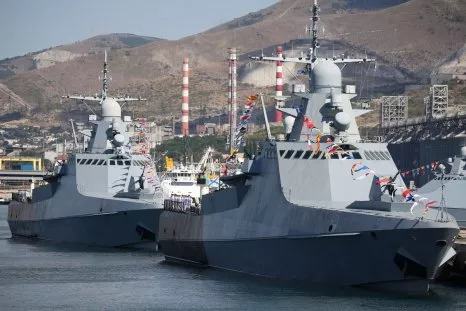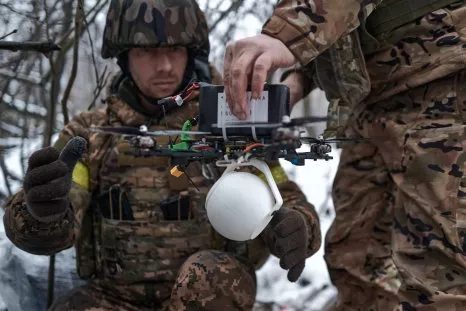Russian Economy Can Sustain War 'Indefinitely' Under Two ConditionsâReport
Spending on Russia's military—which has soared since the start of Vladimir Putin's full-scale invasion of Ukraine—is sustainable in the long term if the country's workforce is big enough and oil prices are high enough, it has been reported.
Russia has faced economic turbulence during the war, buffeted by sanctions and isolation from the global financial system. However, Russia's economy has shown resilience, with the International Monetary Fund (IMF) in January upping its GDP growth prediction to 2.6 percent this year, higher than that of the U.S.
This has been boosted in part by huge increases in the military-industrial complex spending. While inflation is high amid warnings of an overheated economy, former Russian Federal Tax Service analyst Dmitry Nekrasov wrote in the independent outlet iStories that Russia has defied expectations.
He compared the military spending in Russia's 2024 budget—which officially is 6 percent of GDP but could be as high as 9 percent—with the economic growth of other countries that had also spent a lot on defense.
These included Saudi Arabia (9 percent) over the last 20 years, the U.S. between 1955 and 1975 (8.5 percent) and Israel between 1967 and 1993 (19.1 percent), which all enjoyed economic growth. He wrote that some countries had spent twice as much on defense for decades as Russia does today and still grew rapidly.
Nekrasov also said that Russia's war-time deficit spending, which was 1.9 percent of GDP in 2023, is still lower than the peacetime deficit spending in developed countries.
In his view, war-related economic problems are down to depleting the positive balance of foreign trade. While Russia has been hit by sanctions on energy exports, it had built up a big buffer over the last 20 years thanks to a federal budget surplus and low budget debt.
This safety margin allowed Russia to lose exports due to sanctions without suffering "devaluations, hyperinflation, and the inability to provide critical imports."
He noted Russians are earning and consuming more since the war started, with real disposable income 5.5 percent higher in 2023 than in 2021. This is due to high salaries for troops fighting in Ukraine, payments to soldiers' families and increased salaries in civilian sectors trying to attract workers.
Nekrasov said that oil prices dropping to $30 per barrel would be the only economic factor "that will change the length of time Putin can pay for a war of this magnitude from 'indefinitely' to 'a few years.'"
The other challenge Russia faces is a labor shortage, caused by 600,000 people being mobilized and up to one million Russians fleeing the country to avoid the draft.
In February, Olga Bychkova economist at Moody's Analytics, told Newsweek that in Russia staff shortages had become "more acute, and the unemployment rate declined to an all-time low, limiting the capacity to increase production."
"To retain or hire personnel, businesses are raising wages, which is inevitably followed by price increases needed to cover costs for higher wages," she added.
While noting Russia has limited options in a sudden economic slowdown, forcing the Kremlin to choose the high inflation of a currency devaluation, or more domestic borrowing and spending of foreign exchange reserves, Nekrasov said the war-time economy will only hurt Putin in the long run.
"In the medium term, all these problems are not critical threats that can force Putin to end the war," he wrote. The only things that could hurt the war funding are, or if oil prices slump if he "runs out of Russians." Newsweek has contacted the Russian finance ministry for comment.
Disclaimer: The copyright of this article belongs to the original author. Reposting this article is solely for the purpose of information dissemination and does not constitute any investment advice. If there is any infringement, please contact us immediately. We will make corrections or deletions as necessary. Thank you.

